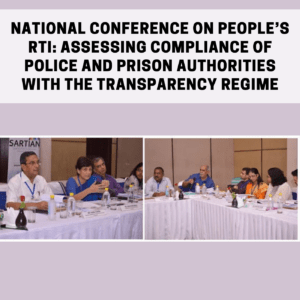Dear Madam Chief Minister,
As you are aware, the Supreme Court Judgment of 2006 in the Prakash Singh case has stressed the need for police reform and issued directions, with a view to improve the autonomy, accountability, effectiveness and responsiveness of the police. Subsequently the Supreme Court has issued certain directions for implementation. Tamil Nadu has not complied with several of the directives and avoided implementation. We do not see any critical circumstance that requires the government to take “immediate action’ via an ordinance when for seven years there has appeared in successive government’s eyes no great compulsion to comply with the Supreme Court’s orders.
Seven years after the said Judgment, the Government has recently issued the Tamilnadu Police [Reforms] Ordinance, 2013 in purported implementation of the directions of the Supreme Court. It is distressing that an Ordinance route has been preferred rather than a regular Bill in the Assembly, which could have enabled an informed discussion both among the elected representatives and among various sections of the public.
It is discouraging to note that the safeguards of independence and accountability explicitly drawn up by the Court’s directives have been removed or ignored in the Ordinance. The composition of the State Security Commission – a body that is set up to curb undue political interference in policing has been severely compromised. A Police Establishment Board to look into transfers, postings and promotions of officers of various levels has also been created via the Ordinance. However the wording of the relevant provisions, rather than insulating it from political influence, makes it vulnerable to the same. In terms of accountability – the oversight body created by the Ordinance is weak and subservient and nowhere resembles an empowered, independent police oversight body that is effective and able to curb policing malpractice and abuse.
We urge that a Bill be introduced to replace the Ordinance containing the following features:
- Clause 3(3)(e) of the Ordinance which provides that a DGP can be prematurely removed “on other administrative grounds to be recorded in writing” should be deleted as it would undermine the autonomy of the police force. Clause 4 should also be similarly amended in case of tenure of subordinate officers.
- There should be an explicit provision for the independent functioning of the DGP and prohibiting political interference in matters of:
- Law enforcement
- Investigation and prosecution of offences
- Administrative decisions relating to individual police officers
- The Security Commission should be an independent body comprising of atleast one or two sitting or retired High Court or Supreme Court Judges, and also 3 to 5 independent members from different sections of Civil Society:
- The State Police Complaints Authority and the District Police Complaints Authority under Clauses 10 and 14 are composed predominantly of police officials, which undermines the very purpose of creation of such an Authority. The State Authority should be headed by a retired judge of the High Court /Supreme Court chosen from a panel proposed by the Chief Justice of the High Court and have 3 to 5 independent members chosen from a panel proposed by the State Human Rights Commission. Similarly the District Authority should be headed by a District Judge chosen from a panel proposed by the Chief Justice and have 3 to 5 independent members. The recommendations of both the State and District Authorities must be binding on the State Government.
- Clause 12 and 15 should be amended to provide for submission of a complaint to the Police Complaints Authority in writing or orally (which may be reduced to writing by an official of the Authority) by a victim or any non-governmental organization espousing the cause of the victims and the provision for a notarized affidavit should be done away with.
The police force today is not only seen but also acts as, repressive system and protected by legal and de facto immunities. This must change. The primary goal of policing must be to ensure an environment in which all segments of the population can enjoy the fullest realization of their individual and collective Constitutional rights. We consider that new policing should be informed by the paramount values of democracy; norms of liberty: the realization of rights and inclusiveness. Thus it is imperative that any new law to govern future policing in the state must be one that takes account of the recommendations of the Supreme Court as well as the needs and values of modern policing. It must facilitate the emergence of a force which is effective, law-abiding and impartial and an institution that is schooled in constitutional values and scientific methods of investigation and law enforcement. This is possible only if the administrative structure provides for a police force that is independent and accountable at the same time.
We therefore urge you, Madam, to introduce a Bill in the Assembly incorporating the directives of the Supreme Court in letter and spirit as suggested above, and refer the Bill to a Select Committee so as to facilitate a wider debate on all issues surrounding the Bill at the earliest. We expect that the Select Committee would then hear the views of various sections of the public and propose measures to strengthen the independence and accountability of the police in Tamilnadu. No law introduced to govern policing today should be passed without wide public consultation.




